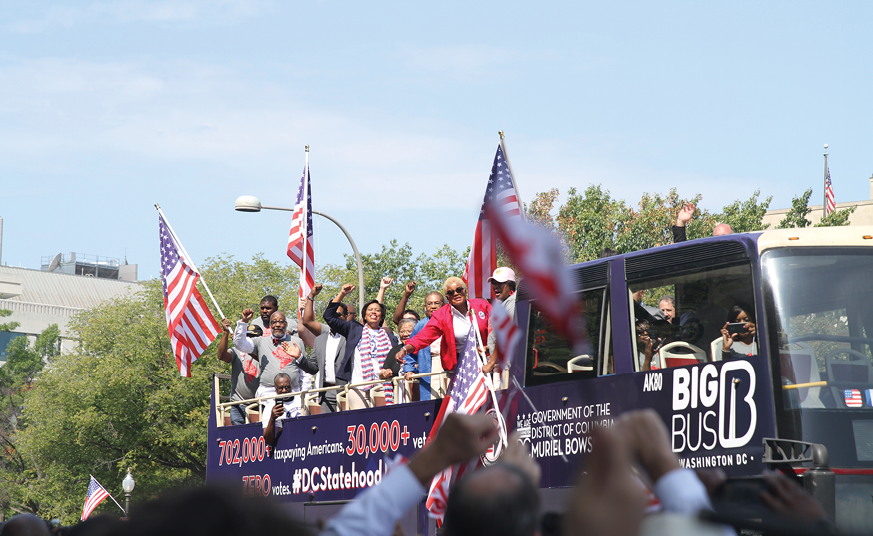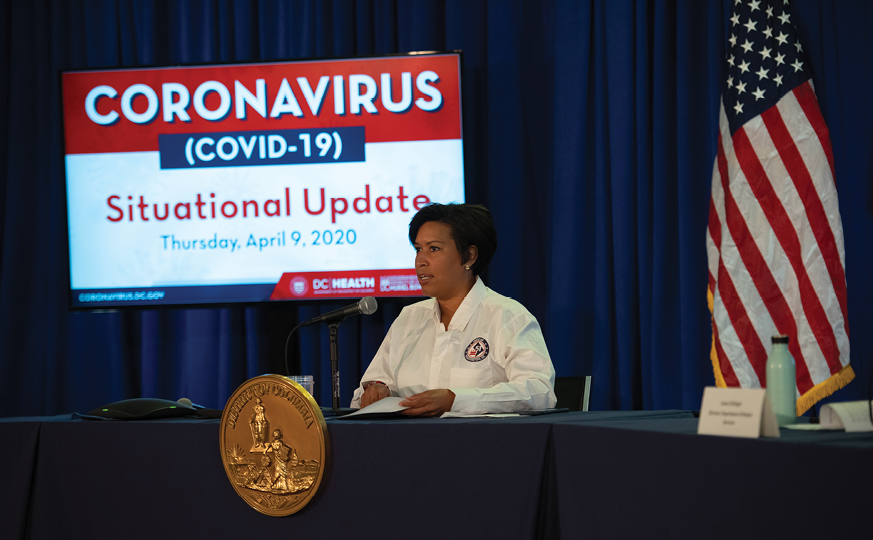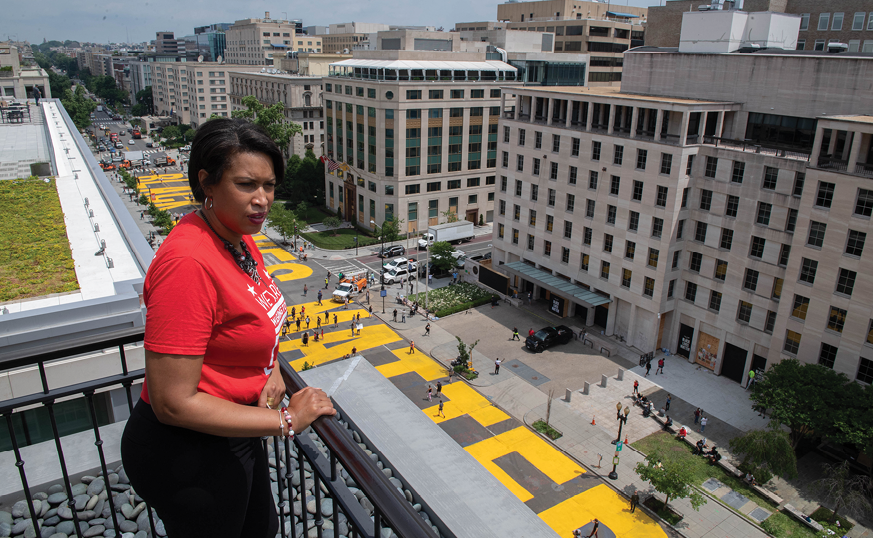- Home
- Media Kit
- Current Issue
- Past Issues
- Ad Specs-Submission
- Ad Print Settings
- Reprints (PDF)
- Photo Specifications (PDF)
- Contact Us

![]()
ONLINE

Resilient DC
Editors’ Note
On November 6, 2018, Muriel Bowser became the first woman ever re-elected as the Mayor of Washington, D.C. and the first mayor to earn a second term in 16 years. Prior to becoming Mayor in 2015, Bowser served as the Ward 4 Councilmember on the Council of the District of Columbia, first elected in a special election in 2007 and re-elected in 2008 and 2012. As a Councilmember, she served as the Chairwoman of the Committee on Economic Development which created more than 5,000 units of affordable housing, passed legislation to build a new soccer stadium, and secured from the federal government the best portion of the Walter Reed campus for D.C. She first entered elected office as an Advisory Neighborhood Commissioner in the Riggs Park neighborhood more than 20 years ago. Bowser earned a BA degree in history from Chatham University and a master’s degree in public policy from American University, and received honorary doctorates from Chatham University and Trinity University.

Mayor Bowser joins District veterans to fly 51-star
American flags along Pennsylvania Avenue ahead of the
historic statehood hearing on September 19, 2020
What attracted you to public service and interested you in becoming Mayor of Washington, D.C.?
I am a fifth generation Washingtonian who knew that I had something to offer Washington, D.C. and give back to my community. Washington, D.C. has changed a lot since I was a little girl. That change has brought a lot of good things to our city, but we know that our city’s prosperity hasn’t been shared equally. So, when I ran for Mayor, it was to give our city a fresh start and more D.C. residents a fair shot – to build new pathways to the middle class that will allow more longtime Washingtonians to stay in D.C. and build a future for their families.
How do you describe your leadership style and what do you see as the keys to effective leadership?
Effective leadership requires having a big vision and setting high expectations for the people around you. Washington, D.C. is unique in the American political system, so I function as D.C.’s mayor, county executive, and governor. In all of these roles, I serve my whole community. It is my job to move our city forward without leaving anyone behind, but I can’t do it alone. I surround myself with exceptionally talented people – people who are passionate about their areas of expertise, but also passionate about improving the lives of Washingtonians.
What have been the keys to driving action and change in Washington, D.C. with the deep partisanship that exists in the country today?
Well, the Washington, D.C. that I am the Mayor of is not the same Washington, D.C. that many people hear about on the news. The real D.C., as I like to say, is a city of more than 700,000 people. We are an extraordinarily diverse and inclusive city. All across our city, Washingtonians want similar things: safe neighborhoods, great schools and parks, good jobs, and opportunities to pursue their interests and dreams and people want those things for their neighbors as well. Our community is committed to and guided by our shared D.C. values, and that allows us to set bold goals and create citywide solutions to citywide challenges.
“To develop our resilience strategy, Resilient DC, we took a hard look at both potential sudden shocks like severe weather, flooding, and infrastructure failure, as well as chronic stresses such as the high cost of housing that challenge our city on a daily basis.”
What needs to be done to effectively address the issue of social injustice and racial inequality in the country?
One thing that we need to ensure is that all Americans have access to our nation’s democracy by tackling voter suppression in all its forms. For generations, injustice has been able to thrive in large part because people have been excluded from power and not all voices and communities have been represented or even had a seat at the table. There is certainly much more to do once we have more elected leaders that represent the diversity of our nation, but that is a good starting point.
How can statehood change the prospects for Washington, D.C. and its residents?
With statehood our nation will finally end the practice of taxation without representation and Washingtonians will have the voice and votes in Congress we deserve. Our lack of statehood affects us in ways big and small. Earlier this year, we were shortchanged $755 million in the federal COVID-19 relief bill, and we are still fighting to be made whole. In June, federal law enforcement officers, many without any identification, roamed our streets and other states sent their National Guards despite our request for them not to.
Our lack of statehood is not just about being denied representation in Congress – it is also about a lack of local autonomy. Members of Congress can block our local laws or restrict how we can spend even our own local funds. Members who were sent here to represent other states and who do not represent D.C. residents or share our values have abused this power to restrict reproductive healthcare and prevent D.C. from setting up a system to tax and regulate recreational cannabis. This is not how a representative democracy is supposed to work and it is time to finally fix this injustice.

Mayor Bowser provides a COVID-19 update
to the public in April 2020
How do you define resilience and how has resilience impacted your work?
To develop our resilience strategy, Resilient DC, we took a hard look at both potential sudden shocks like severe weather, flooding, and infrastructure failure, as well as chronic stresses such as the high cost of housing that challenge our city on a daily basis. Building a resilient DC is about addressing both everyday issues such as poverty and inequality, and also the infrequent, unexpected, and potentially catastrophic events. This comprehensive approach ensures that we are not only stronger and better prepared to overcome disruptions, but also to provide benefits to our residents in the absence of disruptions.
Leading a city, especially in 2020, means being on the front lines of responding to multiple crises and challenges. How critical is resilience as you face these challenges?
Washington, D.C. is fortunate that we went into this crisis strong. In those first few weeks and months, when everything shut down suddenly, we were fortunate to have the resources to deliver meals to our seniors and set up meal sites for students and grocery sites for any resident in need. We have been able to quickly hire hundreds of contact tracers and set up free citywide testing sites so that anyone who needs a COVID-19 test is able to get one.
Now, as we continue through our response and simultaneous recovery, resilience is everything. Residents and businesses have made tremendous sacrifices for the health and safety of our community. We are marshalling all of our resources and tools to help everyone get through this, but it will continue to require a tremendous amount of creativity and flexibility.

Mayor Bowser at Black Lives Matter Plaza in June 2020
Do you feel it is critical to have collaboration and strong global alliances in order to build a more resilient world?
One of the biggest takeaways from this pandemic so far has been the importance of collaboration – globally, nationally, regionally, and locally.
What advice do you offer young people about the need for resilience and perseverance during these uncertain times?
Resilience and perseverance go hand in hand. This year has taught us important lessons about not only being prepared, but being able to adapt and respond to challenges that we never saw coming. We have also learned that with uncertainty must come flexibility. We see our response to COVID-19 like a dial, one that we can dial up or down based on the circumstances and the needs of our community. This approach can be used in many scenarios, not just pandemics. ![]()